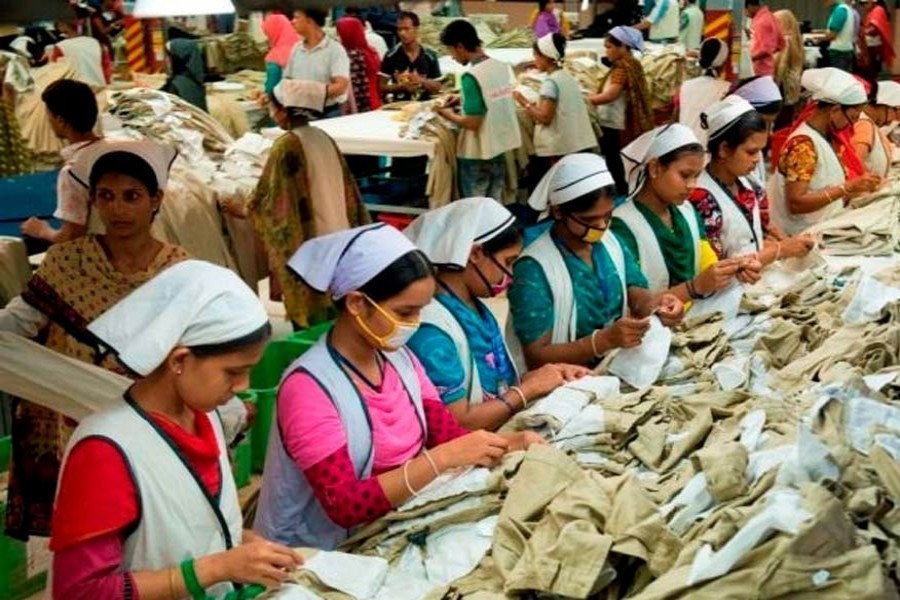The share of woven garments in Bangladesh's export earnings wanes mainly as lax backward-linkage industry fails to support the apparel subsector, insiders say.
Backward-linkage industry is also "important to face the post-graduation challenges", they add.
The woven subsector of the country's principal export industry is likely to face strict rules-of-origin (RoO) requirements in its major destinations, including the European Union, after Bangladesh's LDC graduation as clothing producers will need to comply with double-transformation requirement irrespective of their access to GSP or GSP-plus schemes.
Bangladesh is largely dependent on imported fabrics for woven garment manufacturing as local spinners can meet 35-40 per cent of demand of woven exporters, they say.
Industry people say share of knitwear garments has been rising due to its strong backward linkage that is helping the subsector to ship exports in the shortest possible lead time.
Absence of infrastructure, mainly shortage of gas, required policy supports and financial matters, is discouraging entrepreneurs from making fresh investment in woven fabrics manufacturing, they note.
Data analysis from official sources also indicates the downturn in woven apparel-export share over several years now.
Woven garments contributed over 43 per cent to the country's total exports worth US$34.24 billion in the fiscal year 2015-16, according to central bank data.
The share stood down at 37.40 per cent in the last fiscal while it further dipped to 35.38 per cent during the first half of the current fiscal year, 2021-22, Bangladesh Bank quarterly review shows.
Bangladesh received $8.73 billion from woven-garment export and $11.16 billion from knit-item export respectively during July-December period of the current fiscal year.
When asked about the slide, Bangladesh Garment Manufacturers and Exporters Association (BGMEA) vice- president Md Shahidullah Azim said during the pandemic, demand for woven garments declined as people stayed at home for safety.
Echoing his view, Mahmud Hassan Khan, a former leader of BGMEA, says pandemic was a temporary reason-the main reason behind the decline of woven share is absence of strong backward-linkage industry here.
"Lead time is a major concern of buyers and local woven makers need long time to ship products as they mostly meet fabrics requirements by import," he explains.
Knitwear exporters need comparatively short lead time because they can source raw materials like yarn and fabrics locally, he adds.
According to BTMA, local textile millers meet 75-80 per cent of knitters' demand for fabrics while the percentage is only 35-40 for woven fabrics.
Bangladesh imported 552,859 tonnes of woven fabrics in 2021, up from 490,430 tonnes in 2017, according to BTMA reckonings.
According to a National Institute of Textile Engineering and Research (NITER) study Bangladesh has been in a disadvantageous situation among the RMG-supplying countries owing to higher lead-time constraint.
The competitive advantages earned by cheaper production cost are being nullified by higher lead times.
Depending on foreign sources for raw materials is dragging the industries behind and just for fabrics 30-40 days are being added to the production lead-time, according to NITER study.
In the 90s Bangladesh's lead-time span was 120- 150 days which now got reduced to 90 to 100 days. On the other hand, China can deliver products within 30 to 35 days while lead time for Vietnam is 60 days.
Echoing Mr Hassan's observations, Mohammad Ali Khokon, president of Bangladesh Textile Mills Association (BTMA), says the growth of woven segments remained negligible during last five years for a lack of requisite government policy supports.
Factories set up in backward-linkage industry of woven sub-sector are capital-intensive while there is no guarantee of timely utility connection, he says, adding that factories after having all machinery set up need to wait couple of years to get connection, he noted.
"Gas is a must for a woven factory," says Mr Khan, also managing director of Rising Group.
Factories are suffering from shortage of sufficient gas supply while new industries outside economic zones don't get new connection, says the BTMA leader.
Especial facility should be given for factories to be set up outside economic zones, he adds.
He urged the government to provide required policy supports, including incentives, to encourage investment in this sub-sector's backward-linkage industry.


